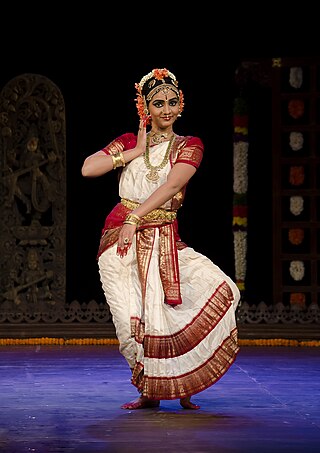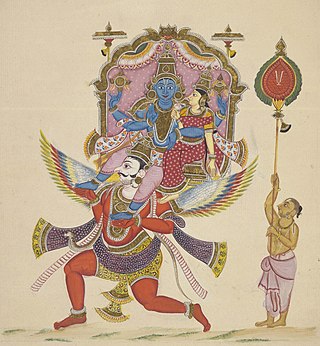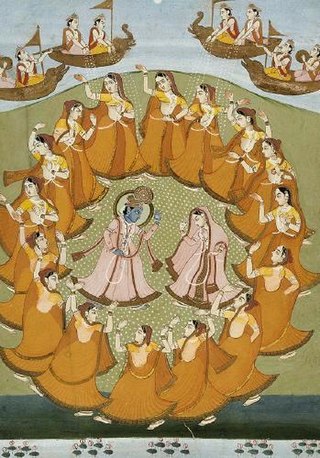
Venkateswara, also known as Venkatachalapati, Balaji and Srinivasa, is a Hindu deity, described as a form or avatar of the god Vishnu. He is the presiding deity of Venkateswara Temple, Tirupati. His consorts, Padmavathi and Bhudevi, are avatars of the goddess Lakshmi, the consort of Vishnu.

Sadguru Tyagaraja Swami, also known as Tyagayya, and in full as Kakarla Tyagabrahmam, was a saint and composer of Carnatic music, a form of Indian classical music. Tyagaraja and his contemporaries, Shyama Shastri and Muthuswami Dikshitar, are regarded as the Trinity of Carnatic music. Tyagaraja composed thousands of devotional compositions, most in Telugu and in praise of Rama, many of which remain popular today. However, only 720 of these are in vogue. Of special mention are five of his compositions called the Pancharatna Kritis, which are often sung in programs in his honour. Tyagaraja composed Utsava Sampradaya Krithis, which are often sung to accompany temple rituals and Divya Nama Sankeertanas which are sung as a part of concerts and in daily life.

Kuchipudi is one of the eight major Indian classical dances. It originates from a village named Kuchipudi in the Indian state of Andhra Pradesh. Kuchipudi is a dance-drama performance, with its roots in the ancient Hindu Sanskrit text of Natya Shastra. It developed as a religious art linked to traveling bards, temples and spiritual beliefs, like all major classical dances of India.

The Gita Govinda is a work composed by the 12th-century Hindu poet, Jayadeva. It describes the relationship between Krishna, Radha and gopis of Vrindavan.

The Bhagavata Purana, also known as the Srimad Bhagavatam, Srimad Bhagavata Mahapurana or simply Bhagavata (Bhāgavata), is one of Hinduism's eighteen major Puranas (Mahapuranas) and one of the most popular in Vaishnavism. Composed in Sanskrit and traditionally attributed to Veda Vyasa, it promotes bhakti (devotion) towards Krishna, an avatar of Vishnu, integrating themes from the Advaita (monism) philosophy of Adi Shankara, the Vishishtadvaita of Ramanujacharya and the Dvaita (dualism) of Madhvacharya. It is widely available in almost all Indian languages.

The Tungabhadra River starts and flows through the state of Karnataka, India, during most of its course, then through Andhra Pradesh, and ultimately joins the Krishna River near Murvakonda in Andhra Pradesh.

Perumal or Tirumal is a Hindu deity. Perumal is worshipped mainly among Tamil Hindus in South India and the Tamil diaspora, who consider Perumal to be a form of Vishnu.

Lakshmi Narayana or Lakshmi Narayan is the dual representation of the Hindu deities Vishnu, also known as Narayana, and his consort, Lakshmi, traditionally featured in their abode, Vaikuntha. The goddess of wealth and prosperity, Lakshmi, is depicted as standing next to Vishnu, who holds the Panchajanya, Kaumodaki, Padma, and the Sudarshana Chakra. Another depiction of Lakshmi-Narayana portrays Lakshmi in the service of Narayana, who reclines on the cosmic serpent Shesha, floating in the Kshira Sagara, the Ocean of Milk.

Melukote in Pandavapura taluk of Mandya district, Karnataka, in southern India, is one of the sacred places in Karnataka.It is built on rocky hills, known as Yadugiri, Yaadavagiri or Yadushaila, overlooking the Cauvery valley. Melukote is about 51 km from Mysore and 133 km (83 mi) from Bangalore.

Oothukkaadu Venkata Kavi or Oottukkaadu Venkata Subramanyar was one of the pioneering composers in Indian classical Carnatic music. He lived in South India in the present-day state of Tamil Nadu. Also known by the name Oothukkaadu Venkatasubramaniya Iyer, he composed hundreds of compositions in Sanskrit and Tamil of which over 500 are available. These were handed down from generation to generation by the descendants of the composer's brother's family.

Radha-Krishna is the combined form of the Hindu god Krishna with his chief consort and shakti Radha. They are regarded as the feminine as well as the masculine realities of God, in several Krishnaite traditions of Vaishnavism.

Narayana Teertha was a Hindu saint and composer, known to be a devotee of the deity Krishna.

The Raslila, also rendered the Rasalila or the Ras dance, is part of a traditional story described in Hindu texts such as the Bhagavata Purana and Gita Govinda, where Krishna dances with Radha and the gopis of Braj. Rasalila has also been a popular theme for other India classical dances including Bharatanatyam, Odissi, Manipuri Raas Leela, Kuchipudi, and Kathak.

Sat Vaishnavism, also referred to as Madhva Vaishnavism, the Madhva Sampradaya and the Brahma Sampradaya, is a denomination within the Vaishnavism—Bhagavata tradition of Hinduism. Sadh Vaishnavism was founded by thirteenth century philosopher-saint Madhvacharya, who developed the Tattvavada (dvaita) Vedanta sub-school of Hindu philosophy.

Vidyabhushana is a vocalist from Karnataka. He sings devotional songs, chiefly Haridasa compositions, and carnatic classical music. He has many albums to his credit, mainly devotional songs in Kannada, Tulu and has given concerts all over the world. His first album was titled "Dasara Padagalu" and the 100th titled "Tanu Ninnadu Jivana Ninnadu". Performing for more than 40 years, he has traveled to many countries including a tour across the United States in 1999., He was honoured with the title of Sangeetha Vidya Nidhi in 1994. He was also honoured the Doctorate by Hampi University.

An onavillu is a simple, short, bow-shaped musical instrument. Its name may come from Onam, a festival in Kerala where the instrument is used in dances, and villu, which means 'bow' in Malayalam. Although still regularly used in rural art forms, use of the onavillu is on the decline.
Raga Tarangini, Tarangini, is a raga in the Carnatic tradition.
Sri Krishna Leela may refer to:
Malladi Suribabu is an Indian Carnatic vocalist and musician from Vijayawada, India. He was conferred with Kala Ratna, a civilian honor by the Government of Andhra Pradesh in 2013 and TTK Award by Madras Music Academy in 2014. He is a disciple of Voleti Venkateshwarulu, Sripada Pinakapani and Nedunuri Krishnamurthy.
Maddali Usha Gayatri is an Indian Kuchipudi exponent, danseuse, guru and choreographer from the state of Andhra Pradesh. A recipient of Hamsa Award and Sangeet Natak Akademi Award, she received critical acclaim for her choreography and performances. She performs ballets in mythological, historical and social themes. One of her works, Nrityam Darsayami, included a troupe of 12 of her disciples performing for 12 hours uninterruptedly.
















